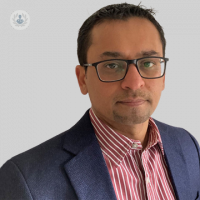Heart failure in children: An expert’s guide
Escrito por:Heart failure occurs when the heart is unable to perform its pumping function effectively. Consequently, certain body parts do not receive an adequate supply of oxygen-rich blood, leading to symptoms associated with heart failure. One manifestation of this condition is congestive heart failure, wherein blood and fluid may accumulate in the lungs. In his latest online article, renowned consultant paediatrician Dr Abbas Khushnood offers his expert insight into heart failure in children.

What causes heart failure?
In children, heart failure often stems from congenital heart defects present at birth. Additionally, heart failure can develop in children due to factors such as infections or medical conditions like cardiomyopathy, a disease affecting the heart muscle.
When heart failure affects the left side of the heart, difficulties arise in pumping blood to the body. This results in a backup of blood in the vessels in the lungs, causing congestion. Conversely, if the right side of the heart is impacted, blood struggles to be pumped to the lungs. This results in a backup in the child's liver and veins, leading to fluid retention in the body.
What are the symptoms of heart failure in children?
Symptoms of heart failure can vary among children and may include:
- Swelling (oedema) in the feet, ankles, lower legs, abdomen, liver, and neck veins
- Difficulty breathing, especially during physical activity, characterised by rapid breathing, wheezing, or excessive coughing
- Poor feeding and inadequate weight gain in infants
- Fatigue
- Excessive sweating during feeding, playing, or exercising
- Irritability
In older children, additional symptoms may include weight loss, fainting, and chest pain. The severity of these symptoms depends on the extent to which the heart's pumping capacity has been compromised. It is important to note that the symptoms of heart failure may resemble other medical conditions, necessitating consultation with a physician for an accurate diagnosis.
Diagnosing heart failure
Diagnosing heart failure involves the primary physician inquiring about the child's symptoms and medical history and conducting a thorough examination for signs related to heart failure. If concerns persist, a visit to a paediatric cardiologist, a specialist in diagnosing and treating heart issues in children, may be recommended.
Diagnostic tests for heart failure may include blood and urine tests, chest X-rays, electrocardiography (ECG), echocardiography (echo), exercise tests, and additional assessments such as cardiac catheterisation, cardiac MRI, and cardiac biopsy.
What are the treatment options?
Treatment options for heart failure depend on factors such as the child's age, the severity of heart failure, its cause, the child's tolerance, and the anticipated long-term outcome. Available treatments encompass cardiac medications to enhance heart function, relieve congestion, and control swelling, as well as interventions like ventricular assist devices (VADs), surgical procedures (especially for heart failure secondary to congenital heart disease), and heart transplants.
The long-term prognosis for heart failure varies based on its underlying cause. While some children may experience a complete recovery of heart function, heart failure often becomes a chronic condition. Encouragingly, there are several methods to manage and control chronic heart failure.
How can parents support their child living with heart failure?
Parents play a crucial role in supporting a child living with heart failure. The child's well-being depends on factors such as age, symptom severity, and treatment. Regular check-ups with a cardiologist are essential, and some paediatric heart centres offer specialised programs for heart failure management. Parents may be required to assist with daily medications, provide nutritional supplements, and facilitate a tailored plan for activity and exercise recommended by the cardiologist.
In conclusion, as parents provide long-term support and vigilance for signs or symptoms of worsening heart failure, they contribute significantly to the well-being of a child navigating this medical condition.
Dr Abbas Khushnood is a leading consultant paediatric cardiologist based in Newcastle and Liverpool. If you would like to book a consultation with Dr Khushnood, you can do so today via his Top Doctors profile.


